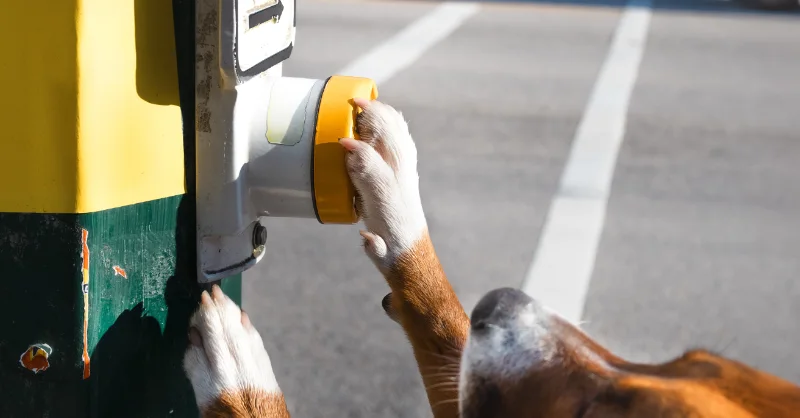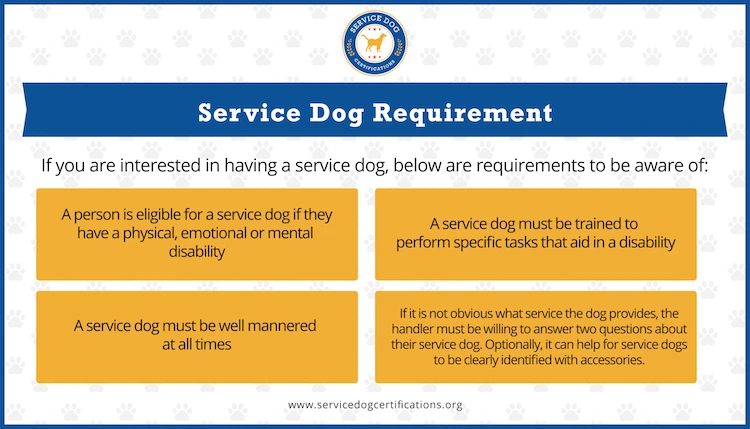Home Page › Blog › How to Get a Psychiatric Service Dog in Texas
How to Get a Psychiatric Service Dog in Texas

The Texas state motto is one simple and beautiful word — friendship. And there’s no better friendship than the one from man’s best friend. Dogs provide humans with companionship and affection. Service dogs, however, can also save our lives.
A psychiatric service dog (PSD) is a particular type of service dog that assists people who have a mental or emotional disability. Let’s discuss a few ways to get a psychiatric service dog in Texas.
What is a Psychiatric Service Dog?
A service dog receives extensive training to perform one or more specific tasks for someone with a disability. The task must relate directly to the disability and be something their handler would be unable to do for themselves. A service dog is also trained to maintain safe behavior in public. Unlike therapy dogs and emotional support animals (ESA), service dogs are highly trained.
Psychiatric service dogs (PSD) receive training to perform tasks that help people with mental or emotional disorders. For example, a PSD trained to assist someone with social anxiety or Post Traumatic Stress Disorder may act as a physical barrier in social situations. These dogs may block strangers from coming too close, preventing a panic attack. Other PSDs may perform deep pressure therapy to reduce anxiety and stress.
Federal and State Laws Protect Service Dogs
All service dogs, including psychiatric service dogs, are covered under the Americans with Disabilities Act (ADA). Under the ADA, service dogs may accompany their handlers into areas the public is typically allowed, even in places where no pets can go. For example, a service dog may enter a movie theatre or grocery store — places other animals can’t enter.
Other federal laws which apply to service dogs are the Fair Housing Act (FHA) and Air Carrier Access Act (ACAA). Under the FHA, landlords and housing managers must allow all service animals into their rentals. Pet fees do not apply to service animals because they aren’t considered pets. The ACAA enables people with disabilities to travel with their service dogs without restrictions typically reserved for pets.
Texas state laws regarding service animals align with federal regulations. In addition, Texas state laws also have the following rules:
- There is a criminal penalty punishable by a fine of $300 and 30 hours of community service for denying access to a person with a disability due to a service animal.
- Employees have up to ten days of paid leave for an assistance dog training program.
- Public facilities and transportation carriers are required to allow a person with a qualifying disability, a service dog trainer, and a service dog to use their services.
Getting a Service Dog in Texas
Before starting the search for psychiatric service dogs, you may choose to consult with your physician or licensed mental healthcare provider. Assess your needs and determine how a service dog could address them.
You can obtain a service dog by:
- Purchasing a fully-trained service dog.
- Buy or adopt a dog, then train the service dog on your own.
- Buy or adopt a dog, then outsource the more complex training. Reserve basic skills training to do on your own.
- Buy or adopt a dog, but outsource all the training.
Finding and Training Your Psychiatric Service Dog in Texas
If you’re looking to adopt a potential psychiatric service dog, these Texas establishments may have the ideal dog for you.

Operation Kindness
Even after 45 years in operation, Operation Kindness in Carrollton, Texas, remains dedicated to rescuing homeless animals. In addition to pet adoptions, they also have a pet food pantry and offer a surrender prevention program. Their extensive Foster Team ensures that animals are rehabilitated and socialized.

Straight Outta Texas
Straight Outta Texas rescues homeless animals and sends them to loving forever homes. Their fosters encourage sociability, but some dogs may also need basic obedience training. Straight Outta Texas offers a variety of dogs and also allows for out-of-state adoptions.

Give Us Paws
Give Us Paws is found in Houston and offers free or discounted training for veterans and civilians with PTSD and other disabilities. Their training program consists of eight to twelve months of group and one-on-one service dog training. The one-on-one training is disability-specific and customizable.

Dog Alliance Academy
The Dog Alliance Academy provides free service dogs for qualified veterans. What’s more, they offer paid service dogs for civilians. The Dog Alliance Academy also hosts a variety of programs like in-person training sessions, trained therapy dogs, and support for veterans with PTSD and children with special needs.
Your Psychiatric Service Dog in Texas
Texas offers numerous rescue centers and service dog training programs. Finding and training your service dog may sound overwhelming, but it’s well worth it. You’ll find that a psychiatric service dog in Texas can become your most meaningful friendship and make your life easier.

About the Author: The writing team at Service Dog Certifications is made up of folks who really know their stuff when it comes to disability laws and assistance animals. Many of our writers and editors have service dogs themselves and share insights from their own experiences. All of us have a passion for disability rights and animals.
11 comments
Leave a Reply Cancel reply
Latest Posts

The Fair Housing Act Explained for Assistance Animal Owners
The Fair Housing Act (FHA) is a federal law in the United States that prohibits discrimination against people who need a support animal for their physical or mental health. The FHA applies to landlords in all 50 states. Under the Fair Housing Act, if you need a service dog or an emotional support animal, your […]

Read More

How a Service Dog Knows When It’s Time For You to Take Medicine
Service dogs can help their handlers by reminding them to take medication. These highly trained dogs know when it’s time for their handler to take medicine through routine recognition, alarm responses, scent detection, and awareness of physical and behavioral cues. Training a service dog to do this is one of the many service dog tasks […]

Read More

The Ultimate Guide to Service Dog Tasks: A Comprehensive List by Disability
Service dogs are remarkable animals trained to assist individuals with disabilities by performing various tasks. According to the Americans with Disabilities Act (ADA), a dog can become a service dog if it has been trained to perform a task that helps with the handler’s health condition. Service dogs can help with physical disabilities as well […]

Read More







I would like a psychiatric service dog. I have been diagnosed with PTSD severe depression and anxieties, but not as a veteran. I thought if I could find a service dog that didn’t make the final test and failed that if I could adopt him that I could finish the training. I adopted a golden retriever that was a service dog she took care of paraplegic but she eventually failed and she ended up being a very good psychiatric dog. My husband got early on set Alzheimer’s I recently had to put him in a facility as I couldn’t take care of him myself he was a wonder and other things but I try go there and feed him daily. I would like to have the dog for both me and my husband so if you do adopt them out can you contact me. Thank you for your time and assistance.
I am desperately looking for a dog for my 24 year old daughter that suffers from ptsd
Panic disorder
And three autoimmune diseases.
She was raised with a golden retriever that was with her all the time for 16 years but she passed away and she has been struggling since
How do I go about starting the process?
Becca heriford
Unfortunately we do not provide referrals for dog adoptions, but we wish the best of luck in your search.
I am trying to find a place to assist a friend with finding a psychiatric service dog for her son that is five years old with anxiety and ADHD. They are low income and he is grandson of a veteran if that helps.
Unfortunately we do not provide any referrals for adoptions of service dogs. Our services are only for current and fully qualified service dog owners, but we wish you the best of luck in your search.
I am 100% disabled female veteran looking to certify my 1 yr old dog. I suffer from PTSD, lung disorder, factor 8 deficiency disorder, and suffer from dysphonia. Looking to certify and ensure my dog is a positive role for my needs is important. Will I qualify for free service dog certification?
Certification is an optional step for service dog owners – it is not mandated by law. Please see this link for more info: https://www.servicedogcertifications.org/how-to-certify-a-service-dog/
Is there any kind of free service dog training in the Austin area. My brother has cerebral palsy and can walk but not drive. He needs a service dog for mental reasons. He suffers from depression and anxiety. He has never known how to care for a dog. We were never allowed dogs in our childhood years. Although, has been around my siblings dog for the past few years the dog is aging and has cancer and is about to pass so it will be devastating for him.
He lives on a disability income so cannot afford to pay for training but I feel it would be so beneficial for him and his mental condition. He was close to my brothers dog and lives with him now and during the passing of our father recently and was literally his best friend so I think this would be good for him.
We are not aware of any and unfortunately we do not provide training referrals. However we will leave your comment here in case anyone in the community can be of assistance. We’ll also be happy to help you if and when you do qualify for a service dog.
My name is Jose Peña and I’ve been diagnosed with depression, anxiety, bipolar disorder and schizophrenia. I am interested in getting a Pyhciatric service dog. 🐕🦺 please get back with me and let me know how to obtain one.
We unfortunately don’t assist with the process of obtaining a service dog (we only offer accessories for existing service dog owners), but you might find this guide we wrote on psychiatric service dogs helpful to get started.